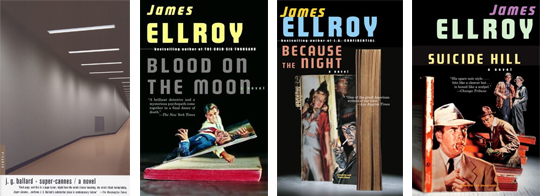re:View – The 2016 Bookshelf: September/October
My year of not reading very much continues. I don’t know what it is this year – maybe I’m just not picking very good books, but I’m just not in much of a reading state of mind. Of course, it may also have to do with the little fact that I’m single for the first time in many years and just really enjoying having the time and freedom to do my own thing and work on some new projects. That, and being able to pick what I want to watch on TV rather than reading my way through somebody else’s choice of evening entertainment. In any case, the bookshelf has grown by a few more books, so here they are.

Super-Cannes by J. G. Ballard
The master of everything that’s fucked up about the human experience turns his attention to the business park – that clinically clean, highly secure and perfectly isolated enclosure of human progress where abominations fester below a perfectly landscaped surface. Retired pilot Paul and his young clinician wife Jane move into Super-Cannes, the business park to end all business parks in the hills above the French coast, where the world’s most brilliant minds live and work in luxury – until one amongst them goes on a sudden murder spree, executing several people and killing himself. Bored out of his mind with nothing to do, Paul investigates the events and becomes obsessed with the motivation behind the massacre, in the process uncovering a sinister secret that could bring down the multi-billion empire of Super-Cannes. I so wanted to love this book because it seemed to feature absolutely everything I loved about High-Rise and Ballard’s other studies of human nature. But somehow I just didn’t get into it. The book takes way too long to get to the point, building and furnishing a (not very atmospheric) atmosphere while hinting at a massive plot revelation that happens too late, and too unconvincingly. The only thing that Ballard does get across very well is the deadly ennui of a person being stuck in the perfect workplace with absolutely no work to do.
Pens: 2 out of 5
Blood on the Moon (Lloyd Hopkins #1) by James Ellroy
Ooh, this is very early James Ellroy. This is baby James Ellroy, and as such quite fascinating. Having read (and obsessed over) his later works that earned him a cult following (the L.A. Quartet and Underworld USA trilogy), I really enjoyed going back to his older books and getting an insight into his brilliant author mind as it evolved. The Lloyd Hopkins books have everything that makes his later work stand out – the obsessively detailed profile of the conflicted police detective, the gruesome and twisted case he investigates, the particular shade of noir that would later become Ellroy’s trademark style – but it’s all there in traces, it’s all just evolving. For a seasoned Ellroy fan these early novels are more like a study of an author in the making. Ellory introduces the book by saying that it was written at the same time as Red Dragon and that his own work is far inferior to “Thomas Harris’ brilliant and ground-breaking novel”. However, I would argue that Ellroy produced a pretty decent first attempt at a serial killer novel, which has everything from a perfectly twisted killer to an incredible range of imaginative murder scenarios, as well as a memorable detective character. It pales in comparison to his later books, but it’s still a very good, fast-paced and enjoyable noir thriller.
Pens: 3 out of 5
Because the Night (Lloyd Hopkins #2) by James Ellroy
Having gotten off to a pretty good start with Blood on the Moon, Ellory seems to lose the plot a little bit in the second Lloyd Hopkins book. The idea for the story is, again, very solid: a psychologist who is equal parts genius and madman uses his powers of manipulation to rope unsuspecting patients into a series of horrendous crimes, which eventually leads to a duel of the minds when he crosses the (by now very well established) character of the detective. But despite the brilliant characterisation and some pretty outrageous criminal action, the story seems to lag, taking a lot of unnecessary corners that were probably meant as plot twists but largely serve to confuse the reader. The book is important for the continuity of this series, but not necessarily worthy of reading as a standalone novel.
Pens: 2 out of 5
Suicide Hill (Lloyd Hopkins #3) by James Ellroy
After a mediocre middle part, the Lloyd Hopkins trilogy picks up the pace again for a memorable finale. Wrecked emotionally by the events of the previous two cases, Lloyd is taken off his duties and faces early retirement, when he sniffs out a series of bank heists that turn into one of the biggest investigation in the LA police force. What’s particularly enjoyable about this book is that it most of the action takes place on the side of the bad guys and as the story unfolds (as opposed to after the event), which creates a very compelling counterpoint to Hopkins’ police work. While Ellroy’s look into the minds of serial killers and offenders in the first two parts look pretty dated by today’s standards, the crimes in this story seem to originate from social circumstances and the very human desire to build up a life against the odds, which engages the reader on a whole different level. Overall, I think this trilogy is a very good early work and certainly holds up against other examples in the genre from its time.
Pens: 3 out of 5
